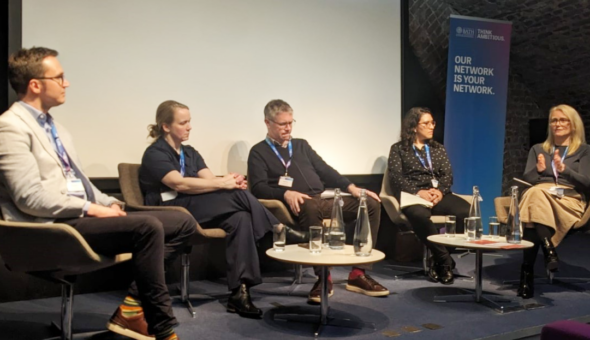Throughout October, we’ll be hosting a Crossing Boundaries takeover, exploring issues around modern slavery to mark Anti-Slavery Day on the 18th.
Objective is an exhibition that combines survivors’ first-hand testimony with photographs of personal belongings significant to their experiences. The project was created by former School of Management PhD student Emma Barnes-Lewis, now based at the Global Reporting Centre; photojournalist Amy Romer; and Maya Esslemont, director of After Exploitation. The exhibition also received support from Professor Andy Crane.
Amy and Maya spoke at Crossing Boundaries: The 2023 Business and Modern Slavery Research conference – where Objective premiered – about the background, creative process and findings of the project.
Amy Romer: A key thing about the project is that we all come from different disciplines – we're pairing academic research with myself, and through an NGO lens with Maya. The idea of coming together as a group to explore this issue was really exciting.
When I was researching a previous project – The Dark Figure, which I made from around 2014 to 2016 – I was looking at images from media and NGOs to see how modern slavery is represented. It was clear that there are all kinds of problems and misrepresentation of the issue. There are lots of dubious images around anonymity, particularly, and projects rarely include survivor voice.
The first question we wanted to address was: how do we avoid those issues of misrepresentation?
We worked with a number of survivors at a London workshop in 2022. We also held interviews with them before the workshop and asked them to think of an object or a belonging that that in some way tells the story of their journey of support through the UK system. At the workshop I was able to photograph the belongings and we had conversations about their experience.
Maya Esslemont: In terms of the policy context, 2022 was when the rhetoric underpinning the Nationality and Borders Act really ramped up in the UK press. This law restricts the nature of support offered to victims by restricting who is recognised by the Home Office as a victim of trafficking. This includes exemptions for victims that have a criminal sentence of 12 months or more, including both suspended sentences and cases where victims were criminalised as a direct result of their exploitation.
During this period, we also saw legislation bringing in what was dubbed by the charity sector as a ‘trauma deadline’, allowing the Secretary of State to essentially inform victims that they have a set number of days by which all major evidence in their case has to be submitted. If you think about the fact that we're talking about the worst experience that people have had in their life, coupled with the fact that they need to have an understanding of the legal relevance of those experiences and those details, that's a very high threshold.
Lastly, one of the key changes within the Nationality and Borders Act was penalising survivors in cases where they couldn't provide evidence soon enough in their recovery journey.
As we started the project, the policy context became much more hostile in the UK through the Illegal Migration Act, which specifically legislated to prevent survivors from accessing their rights under the Modern Slavery Act in cases where they entered the UK without leave to enter. So, for example, in cases where victims were forced, coerced, or deceived into crossing borders, which the Home Office recognises is an indicator of trafficking, the victims are denied identification and associated support because of some of the situations caused by their trafficking.
We asked survivors through semi-structured interviews to talk us through their support journey, whether that was formal support through the Home Office-run national referral mechanism or other community-based forms of support.
One of the themes that emerged was the role that self-advocacy and informal support played in people being able to access not only their immediate needs and subsistence, but also elements of the legal process that you would expect to be provided on a statutory basis.
The second was access to healthcare. This was exacerbated by ambiguity around recourse to public funds and people's immigration status. Many needed to provide ID and a stable address before accessing a GP, let alone specialist referrals. Survivors often reported a high level of expectation on them to provide detailed forensic evidence of their abuse, often in a way that was traumatising and without formal support to accompany them through this.
Finally, there’s the burden of proof. We often saw that survivors were expected to provide a great deal of detail very early on, but often opportunities to identify them had been missed. Modern slavery is described as a hidden crime and as difficult to identify, but in practice we know people have disclosed exploitation first to a police officer, then potentially a social worker and multiple other frontline professionals before anything was actioned. The expectation on survivors in some of these situations is ridiculous.
Amy Romer: Right now, victims that approach police aren't guaranteed any protection from immigration enforcement. As one of our survivors said: trust goes both ways.
There's currently little stability through opportunity, too. People going through the national referral mechanism face restrictions on work and are outright banned from working if they’re going through the asylum process. It puts them in a very difficult place. There’s also inconsistency in what the support journey looks like.
And finally, it's important to remember that for the survivors we spoke to, their journey was before the Nationality and Borders Act and the Illegal Migration Act were put into place, and yet they already had this very piecemeal support from the government. To imagine what that would look like now is a frightening prospect.
Respond



